This Thursday, I’ll host a Zoom for paid subscribers with two conversation prompts: “ask me anything” and, “what’s your dream ultra to run or trip to take?” If you’d like an invitation to the monthly online meetup and occasional bonus posts—and my deep gratitude—please consider upgrading your subscription to the supporter level.
I had an unremarkable week, and when that happens, I turn outward and ponder, Who do I know or follow who’s doing something interesting that’s worth spotlighting? It hit me on Saturday: It’s Chicago Marathon weekend, and a writer I admire is running it!
I subscribe to 67 Substack newsletters, and
by is one I read most regularly for its think pieces and comment threads. Last week, for example, I became absorbed in her well-researched and thought-provoking essay “Why Women Clean,” and I added my comment to 250+ others. She doesn’t write about running much, but I know she’s a dedicated runner because we follow each other on Strava, so I knew she would be lining up for the marathon Sunday morning.I reached out to do a Q&A about her race, which follows below, not only because I want to hear the details of how it unfolded. I also would like to prompt all of you to consider the virtues of a half or full marathon, and I hoped to stoke my waning desire to run a road marathon this spring.
If you subscribe to this newsletter, chances are you prefer to run and hike trails more than pound pavement. You might run ultras at a tortoise pace with many uphill hiking breaks along the way. You may, like me, be over the hill age-wise, with your faster days progressively further and faster in the past. (As the wise elder of ultrarunning, John Medinger, once remarked, “The older we get, the faster we were.”) Therefore, the prospect of running a road marathon at a faster pace than on trail—and running the whole damn thing, no walking breaks—and then facing a finish-line clock that quantifies just how much slower you are now than, say, two decades ago, might feel borderline terrifying. It does to me, anyway.
But, let me tell you and remind myself of this: marathon training is good for you.
Nothing gets you in better shape as a distance runner than a well-designed training block, lasting about 12 to 16 weeks, leading up to a marathon (or a half-marathon, which has comparable benefits). If you want to run a strong, long, mountainous ultra in the summer or fall, then preparing for a spring marathon is an ideal way to kick off your training, before it shifts to adapt to the specifics of the trail terrain and elevation profile of your trail races.
Road-marathon training prompts us to run faster and hone a precise pace much more than we ever would on trail, since a trail’s terrain and hill profile make for a wildly varying and generally slower pace. On the flatter, smoother road and track, we’re more speedy and steady than on single-track dirt. We pick a marathon finishing time goal (say, 4 hours flat, which is what a 55-year-old woman like me will need to run to qualify for the 2026 Boston Marathon), and then we do specific track workouts, tempo runs, and long-run progressions to make that marathon goal pace (9:09 minutes/mile for a 4-hour finish) feel sustainable.
Training for road racing therefore builds the cardiovascular system and improves running cadence more so than trail running typically does. Personally, here in the San Juan Mountains, I default to “the ultra shuffle” of slow jogging, and normalize a trekker’s pace of only 4 to 5 miles per hour (15 to 12 minutes per mile), because I downshift to hiking so frequently on the steep, rocky uphills. Forcing myself to run at an uptempo pace on our town’s flat paved bike path, with quicker turnover and a higher heart rate, makes me run more like the faster runner I used to be. And it translates to better endurance for trail running, too.
I’ve run 20 road marathons total since my first in 1995 (versus 103 trail ultras, so you can see which I prefer). I thought my last road marathon in 2022 would truly be my last. I’d had enough, I have nothing left to prove, and that road race hurt at the end! But I registered for the Napa Valley Marathon this coming March as an anniversary celebration—30 years since my first marathon at Napa when I was a 25-year-old grad student. I may downgrade to the event’s half marathon. In any case, I anticipate that having this half or full marathon on calendar for the first Sunday in March will imbue my winter running (much of it on a treadmill due to the snowy climate) with focus and purpose, and I hope it will prime my fitness for summer mountain races.
Hearing Anne Helen Petersen’s enthusiasm about her marathon last Sunday filled me with motivation and excitement about my next Napa. Chicago was her fourth marathon, and she still has a beginner’s mindset of discovery, curiosity, and wonderment, which is the mindset I want to rekindle! She also, at age 43, runs with gratitude that she discovered running later in life, in her thirties.
In mid-2022, after having run half marathons but before her first full marathon, she wrote in this post, “The Quiet Glory of Aging Into Athleticism”: “How is it, at age 41, that I feel like my body can do more—and that I can take more joy in it—than ever before? I’m not faster, but I’m more resilient. I’m not doing as many overall miles, but I feel stronger. I love it more, and more feels possible.”
Both she and I are late-blooming athletes. “Not-being-athletic was the story I told myself about who I was,” she wrote, and I can relate, having been a smoker and party girl throughout adolescence and college.
You can change the story you tell yourself. I’ve talked to other people who discovered running in midlife and are kicking ass as runners in their sixties (Becky Bates being an outstanding example). You can get moving at whatever level you can manage and take yourself seriously as an athlete by setting and training for goals, starting with walking your local Thanksgiving 5K Turkey Trot, for example. Maybe a marathon is in your future, too.
Anne Helen Petersen’s Chicago Marathon recap
After finishing, Anne posted on her Instagram, “This was Number 4 and absolutely my favorite,” in large part because of the energy of the crowds and a 12-minute PR! Our Q&A that follows, from Monday, has been edited for length.
SLS: First off, big congratulations. How are you feeling the day after?
AHP: I actually feel really good! I got a lot of sleep last night, plus I had to walk nearly a mile back to the hotel after the marathon, which I find really helpful in getting some of that ache out of your legs.
What made you choose the Chicago Marathon?
A friend of mine is from Chicago, and if you run Chicago five times in 10 years, you can get entry to all future Chicago marathons. So she was doing that, plus I’d never run a really big marathon before, and Chicago seemed like a great one to start with. [This year’s Chicago Marathon, the biggest ever, had over 50,000 finishers!]
Bigger question: What made you choose a marathon at all; why not stick to the half-marathon distance?
For years I told myself I had no interest in running a marathon—but I did love pushing myself on weekly runs up to 15, 16 miles. Sometimes I’d be training for something, like a Ragnar Relay, and sometimes I’d just be “training for life,” as I used to tell people when they asked. Honestly, I think I was scared of what my body would do past 18 [miles]. I don’t have a ton of experience with cardio exhaustion. I wasn’t an athlete as a kid, and unfamiliarity can be terrifying.
But back in 2022, our Ragnar team (which is usually 12 people running segments of a 200-mile route over about 36 hours) got knocked down to 10 people at the last minute because of Covid. We decided we wanted to make up the miles, and I ended up running 27 of those 200 total miles myself. Granted, it was over three different legs—but I did it (on very little sleep!), and it gave me the confidence that I could push farther. That was July, which meant I was already pretty trained up for the Portland Marathon that October.
Before we talk about how Sunday went, I’d like to ask about your training. Did you have a coach or follow a plan, and if so which?
In the past I’ve been a loyal follower of the Run with Hal app … but because of the training I’d done for the previous three marathons, I felt confident coming up with my own plan, which involved solid builds for two weeks then deloading a bit for a third, then repeat. I like running over 20 at least twice—which I did—and average between 30 and 40 miles a week. A game changer in my running life has been the addition of significant strength training. I do at least one 45-minute Peloton Full Body workout every week, and 10 to 20 minutes of some sort of weighted core four to five days a week.
Did you do any speed work in training and if so, what was your favorite workout?
I’m irrationally terrified of speed workouts. I think it has a lot to do with the timed mile in middle school, or just hating organized competitive sports. I also don’t like it when my training plan says to do “tempo” [generally defined as a moderate-intensity effort sustained for at least 20 minutes, at a pace roughly between one’s 10K and half-marathon race pace, often described by the oxymoron “comfortably hard”]. What if I feel like crap that day! Instead, I’ll start a run (if I haven’t run tempo that week) and see if the legs feel fast or slow and try and listen, and then I’m very good at pushing myself. If I’ve already done a tempo run that week, I’ll do some hills (I love hill repeats, and we have so many good hills just out my door). Sometimes my best training is just: you feel fast today, so go even faster.
What were your goals for this marathon, beyond finishing? Did you have a marathon goal pace and/or a finish time goal? Did you have any unquantifiable or process-oriented goals?
Before I started running marathons, I would frequently injure myself—just little stuff, like hamstring strains, but stuff that would force me to dial back. One of these little injuries convinced me to give up on my running watch back in 2014. I kept pushing myself to go faster and beat my watch times, and kept hurting myself.
Since then, I’ve come back to the watch—but only by giving myself permission to just run. I opted for hill training instead of speed training, did a bunch of trail running where time just didn’t really matter, and felt very steady and confident in my pace, which was usually somewhere between 10:00 and 10:30 per mile.
I don’t know if it’s the weight training or getting a dog that really loves a 9-minute mile, but this training cycle I started pushing myself in ways I hadn’t ever before. Beverly (the dog) pushed my pace down to around a 9:30, and that felt good if astonishing, and then I started playing around with pushing that pace even lower on short runs and extending that pace with long runs. For my last 21-miler, I kept a steady 9:20-9:30 [average pace per mile], and that was with over 700 feet in elevation gain over the course of all those miles. Since Chicago is a totally flat course, I was hoping to replicate somewhere around that 9:30 pace.
Oh, and I finished my Missoula Marathon [in late June of this past summer] feeling pretty crappy, so I wanted to feel good!
OK, let’s unpack the marathon chronologically. Ideally, we show up to a start line feeling well rested with fresh legs from the taper—but that often isn’t the case due to travel fatigue, life stressors, funky restaurant food the night before, or any number of things. How did you feel physically and mentally as you stood in the starting corral waiting for the start?
I arrived at my hotel in Chicago at 2 p.m. on Saturday [the day before the race] and went straight to the expo to pick up my bib, and then my friend and I walked around a bit to get back to the hotel—basically the opposite of what you’re supposed to do. You’re not supposed to arrive the day before, you’re not supposed to be on your feet that much, etc. etc. But I’m not trying to run an elite time, and flying in Saturday actually made it so I was much better rested the two nights before and spent less time driving in rush-hour traffic.
In the past, I’ve had massive problems with sleeping the night before a big race—I’m just so excited!—so I now take one Ambien and feel no qualms about it and sleep like a baby (and don’t wake up groggy, either). Our start time was 8 a.m., which was amazing—we went to bed at 9:30, woke up at 6, took our time having coffee and race-day breakfast, then walked the 30 minutes to the start corrals. As is the case with a lot of [big-city] races, you don’t actually start running for about a half an hour after your official “start”—there’s just a lot of slow walk forward [toward the start line due to the crowd]—and I eventually started my watch at 8:26.
I was somewhat amazed when I saw the split for my first mile—8:48—because I hadn’t felt like I was running fast at all. I felt like I was soaring.
How were you feeling, physically and emotionally, around the halfway point, and what was going through your mind?
I basically don’t let myself think about the halfway point. Miles 10 to 20 are toxic (for me!) if I think that way, because then you just think about how much you still have left. Instead, I think in five-mile chunks. First Five Mile Chunk, DONE. Second Five Mile Chunk, DONE. Mile 13 I wasn’t thinking about anything other than “I’m two miles to finishing Chunk 3.”
If I think back physically at that point, I was just beginning to feel my legs—and I was also a bit hungry, even though I was taking Huma Gels every four miles like I usually did. Feeling that then helped encourage me to grab a half of a banana when it was offered a few miles down the road.
What was the lowest moment during the marathon in terms of discomfort or discouragement, and how did you work through it?
Is it shitty to say I didn’t really struggle in this marathon?
No, that’s great!
I think the conditions were just so ideal and the crowd energy so powerful that I never really had the opportunity to get in my head and connect strongly with any feelings of fatigue.
You had a strong second half and gradually got faster, almost achieving an even split between the first 13.1 miles and the second half. What enabled you to stay steady?
My best friend Alaina is my favorite running partner, no matter the distance, and this is the second marathon we’ve run together. It’s hard to describe just how motivating the crowd is in this scenario—it’s absolutely constant. You just feel so proud to be out there doing this thing with 50,000 other runners. I often feel so solitary running, and people in the rest of my life sometimes treat it like it’s such a wild thing, or they’re astonished by the mileage. But here—you’re here with your people! And those people are truly from all over the world, running all manner of paces, just doing the thing because it matters to them. It’s really something.
How did you feel and what went through your mind in the final stretch?
I remember this feeling from the Eugene Marathon and from my long runs this cycle of just letting your body keep doing what it’s been doing. It knows the pace; it wants to stay there. So that’s where I was, running very steady 9:30 splits for those last six miles (it shows longer on the official clock because getting electrolytes/water necessitates a brief stop).
This might be a good time to talk about philosophies behind watch time [which is the moving time that the watch records] versus chip time [the official race time after you cross the starting mat]. I understand why some people live and die by chip time, but for me, I want to know how fast I was running when I was running, not how fast I’m running if you account for the amount of time I had to wait for a port-a-potty or to find and give my friend’s kids a hug. So there’s a real difference between what you see on my official time [4:30] and my watch time [4:09].
Did you have any mantras going through your head?
One of my friends on the island has little girls who make Taylor-Swift-style bracelets, and my other friend and I asked them to make ones with our Chicago running mantras on them. Mine was Steady Goes It because I knew that if I found my groove at a 9:30 pace, I could maintain it through those final miles and significantly decrease my overall time! So thank you, Alison and Avery, for bracelet encouragement.
Back to the goals question above—which did you meet?
I made my goal (watch) time of 9:30 splits—and didn’t feel like I was going to die! This experience makes me think about what it might look like to push for an even faster time. But at the same time, will I run another marathon with this perfect and this fast of conditions?
What did you learn from this marathon, running-related or more generally about life?
I learned that I can actually run faster than I thought I could and not injure myself, so long as I have the proper strength and recovery plans in place. That’s the lesson from this entire training cycle, and it feels really surprising and delightful to be getting (slightly) faster.
What are you thinking with regard to where to take your running next? Are you perhaps already getting excited at the prospect of another marathon?
I am such a planner—the sort of person who’s already thinking about the next marathon before I’ve even finished this one! My partner and I are figuring out a spring marathon right now. One liberating thing about Chicago, as I noted above, is that I probably won’t replicate this time on another course, so I can make up new goals for other courses, like if I do New York, it’ll just be to feel really good and strong and finish New York! Or if we do Eugene, it’ll be to beat my time from the last time I ran there, not to beat this Chicago time. I’m good at shifting my goal posts, and since I don’t have a younger self to compare myself to, I’m mostly just grateful to have a body that can run at all.
Her comment above, “I probably won’t replicate this time on another course,” prompted an email exchange in which I encouraged her to think more openly and optimistically about her potential, because the erstwhile coach in me believes she could indeed lower her time with more dedicated and nuanced training. She replied:
I am very inspired by your coaching advice. Something I've learned as a person with very type-A, reforming perfectionist tendencies is that if I want to keep myself healthy, I have to set my goals reasonable and then overshoot them. So going into this marathon, I told my partner Charlie that I just wanted to feel good. The 9:30 pace was so secondary! But I also knew that gave me permission to meet it or not meet it and still be very proud of myself. I don't know if this psychology is the result of my fear of competitive sports, a fear of losing/failing, or a fear of getting injured (again)—it's probably all three. But I do think I can be faster than this, and what a marvel to think that we can also get faster as we get older — but also that we don't need to!
Given your 75-mile hut-to-hut trek in the Dolomites in early August (detailed here in this great how-to post), do you see yourself branching out to trail running long distances?
Two years ago, I was registered and training for a 50K in the Oregon Cascades but had to drop out after I got a bad cold and sprained a rib coughing. But I live in one of the best places for trail running in the United States—or, at the very least, I live an eight-minute ferry ride away from one of the best places for trail running [around Bellingham, Washington], and I’m eager to explore a lot more.
Congrats again, and thank you for sharing your marathon story!
Postscript:
Yesterday, I listened to coach Mario Fraioli’s latest podcast, and his answer to a question about marathoning and aging relates to our talk above. He said: “If you are someone who takes up running and catches the bug say in their forties, and now it’s part of your life and you’re training consistently and you want to improve your marathon time, then you’ve got a bit more runway than someone who’s been at it 20 or 30 years. You just don’t have that toll on your body. You have more room for growth and younger legs. How long that [progress] goes will depend on the person. But I’ve coached a number of people who started running in their late thirties, early forties, and really enjoyed it—started to scratch that itch and wanted to see what was possible—and were still running faster as they approached 50.”
Related:
If this post motivates you to train for a marathon or some other long-distance run, and you feel you need a coach, I suggest reading my post on how to find a coach who’s right for you:
You can also order my book (geared more toward trail/ultra but containing a great deal of basic advice relevant to any type of running), which distills my coaching advice and inspiration.
And here is my last road marathon report, from the Ventura Marathon, which ran down memory lane because the route’s first miles looped around my childhood home, prompting me to consider my development and aging as a runner:
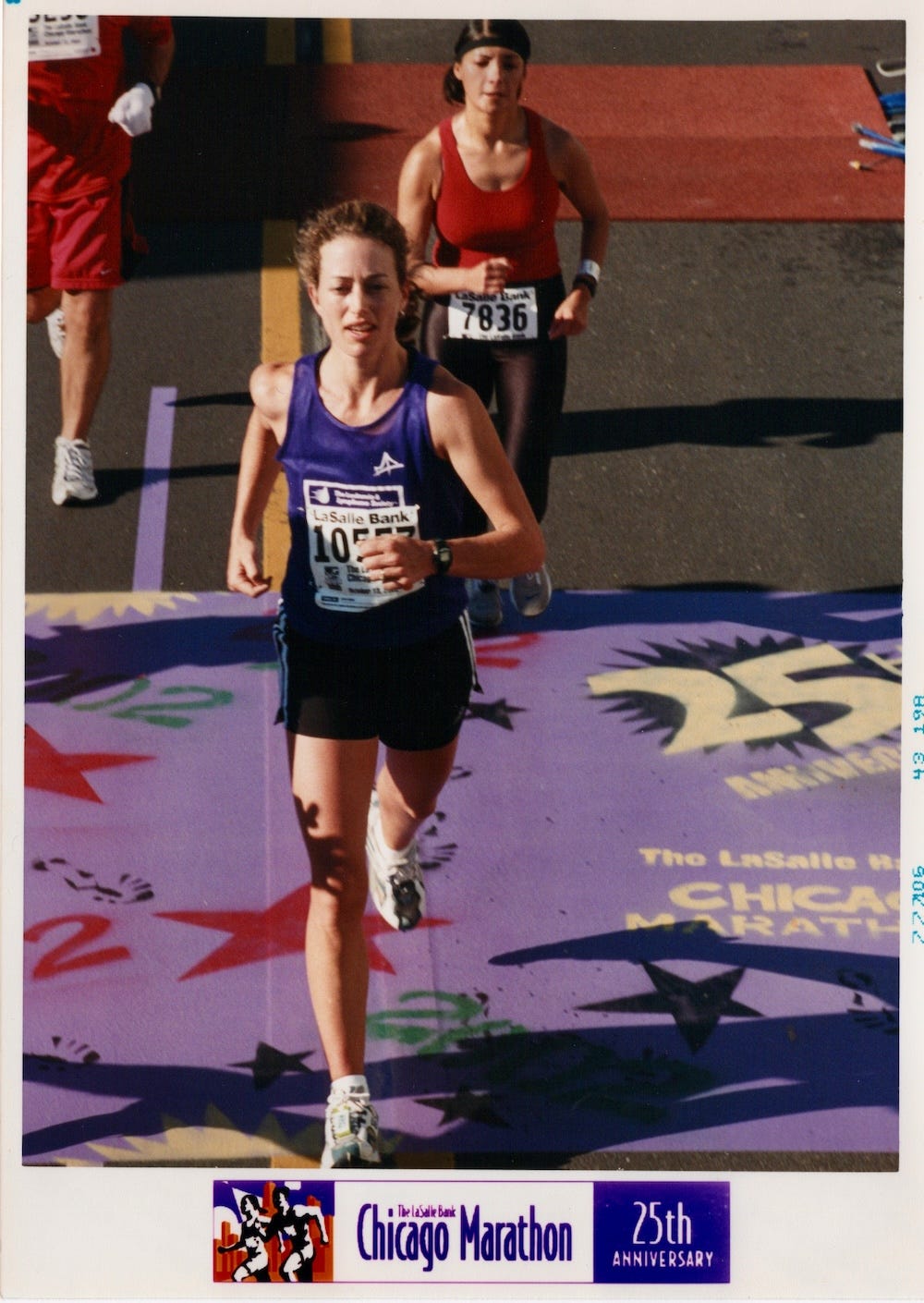

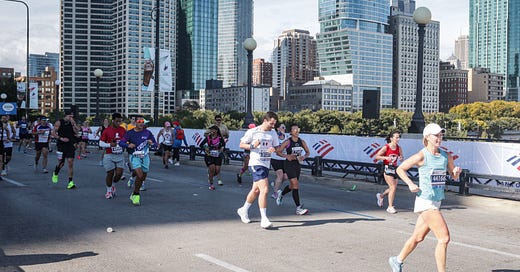


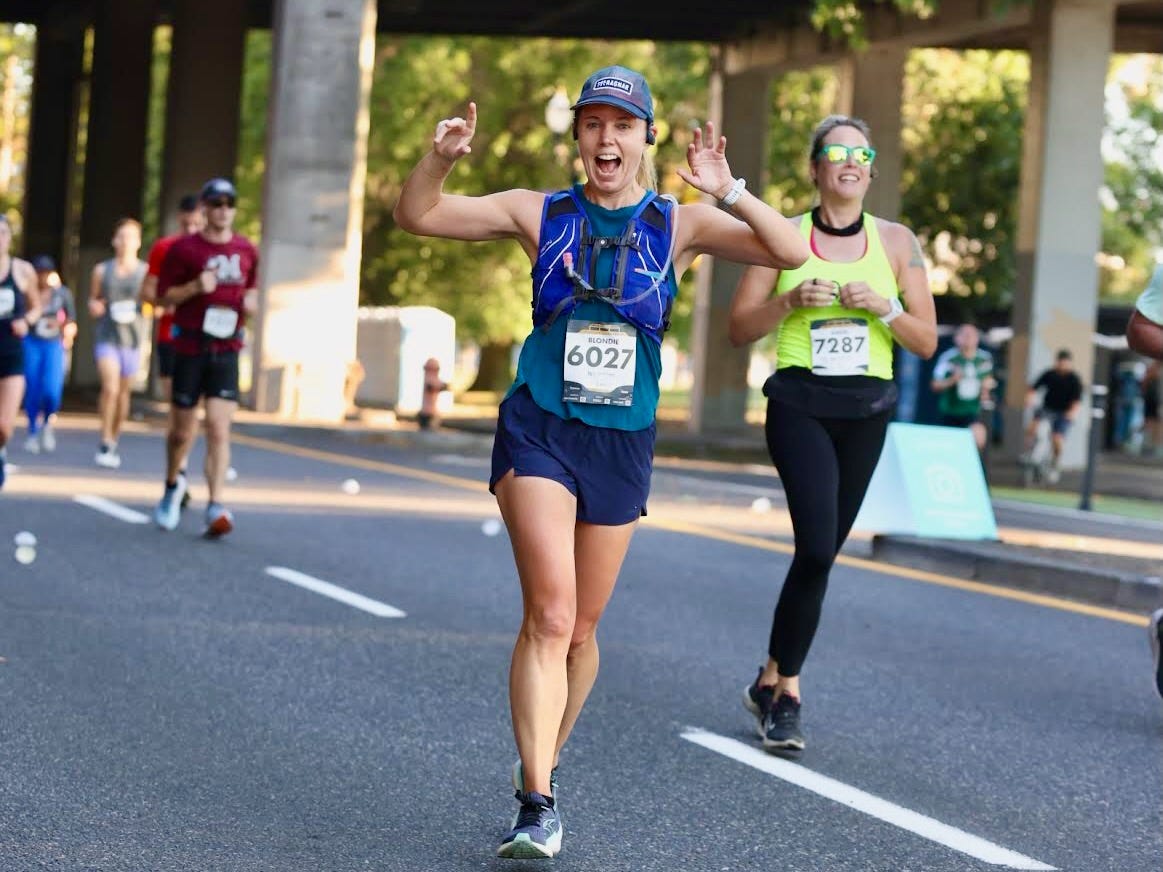
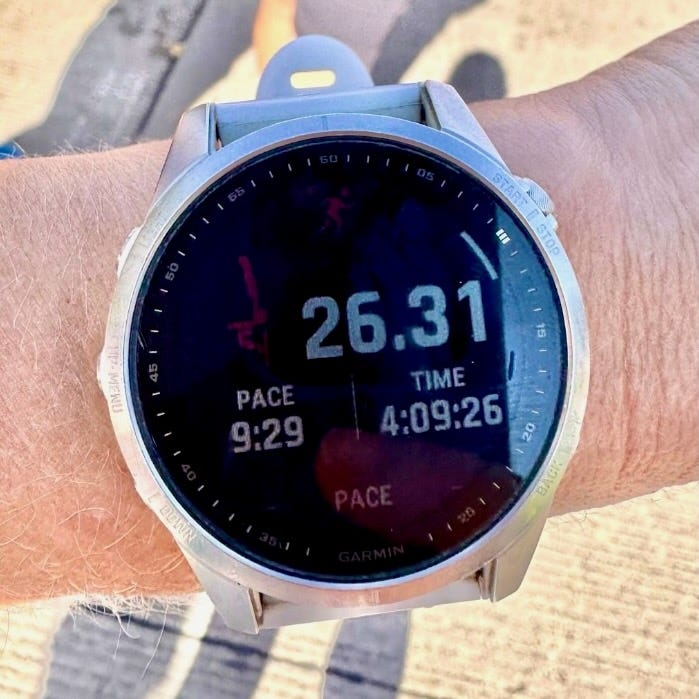
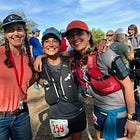
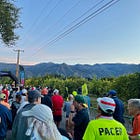
Enjoyed this post so much!! And her final time was my finish time during my second marathon - CIM. I was 64 and felt awesome when I finished. Best ever. Never felt that good again after a marathon. Now I love 50k’s (10 finished so far) and I entered my first 100k next April - climbed mount whitney this past week and experienced my first ride and tie championships. Life is all about new experiences and pushing your limits-which certainly change as you age. Cheers!
Super cool post. I'm not an avid racer, and I prefer the trails. So, perhaps it was due to peer pressure, or perhaps it was because I needed to confirm that I could do it, but last year I followed an 8-week, trail to marathon program and earned my first sub3 marathon. This is to say, YES, let's mix it up. Let's try shorter stuff on the roads, let's try harder stuff in the mountains, let's do it all while we can. Because why not?